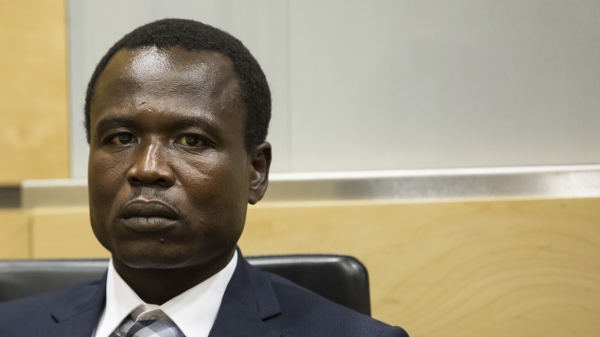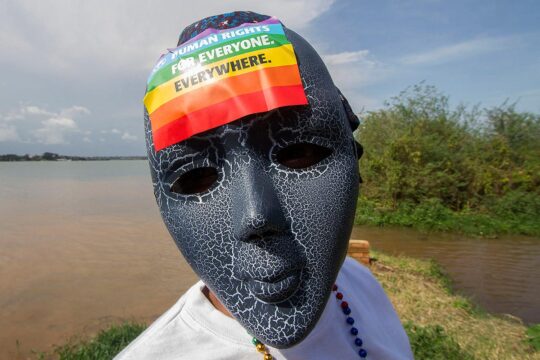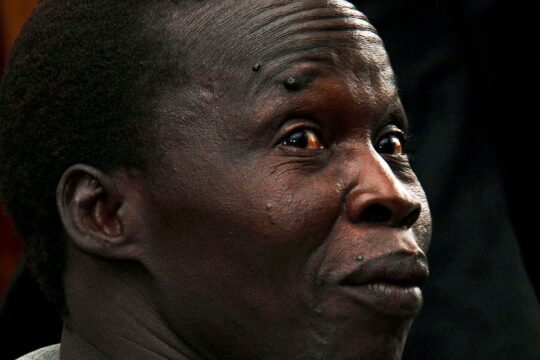The first stage of Dominic Ongwen’s trial is coming to an end before the International Criminal Court (ICC). In mid-April, prosecutors will call their last witness, and then it will be the turn of the defence to present its case. Ongwen, a former commander of the Lord’s Resistance Army (LRA), is charged with crimes against humanity and war crimes committed in northern Uganda. His lawyers, hoping for an acquittal, say he suffers from mental problems.
“We all agree that Mr. Ongwen was in a traumatizing environment,” psychiatric expert Catherine Abbo told the Court on March 27 this year. After being kidnapped by the LRA at age 14, Ongwen was at first in “survival mode”, she explained. But very soon he was promoted within the ranks of the rebel group, which was at the time fighting the regime of Ugandan president Yoweri Museveni. The child soldier now grown up climbed rapidly through the ranks of the militia led by Joseph Kony – also wanted by the ICC but still on the run –, becoming commander of the notorious Sinia brigade, one of four LRA brigades.
Like the two other experts called by the Prosecutor, Catherine Abbo was not able to meet the accused, who refused, but was able to examine video footage and consult testimonies. She says his promotions were a reward which gave him better living conditions and perhaps “protected him from other traumatizing situations”. Nevertheless, there is nothing to indicate that Ongwen was mentally disturbed when he committed the crimes alleged by the Court, says the expert. He faces 70 charges of crimes against humanity and war crimes for murder, rape and forced marriages committed between 2002 and 2004 in northern Uganda, where the Court says Ongwen led several attacks on camps for displaced civilians which were supposed to be protected by the Ugandan regular army (UPDF).
Was Ongwen responsible for his acts?
As of August 2016, defence lawyers Krispus Ayena Odongo and Charles Taku have spoken of the accused suffering from mental problems at the time of the alleged crimes, suggesting that the defence strategy is aimed at a verdict that he was not responsible. At the trial opening on December 6, 2016, his lawyers argued, presenting expert reports, that their client was unable to follow his trial but did not convince the judges. They nevertheless appointed a new expert, who concluded that Ongwen was in a fit state to follow the hearings but was suffering depression because of his incarceration. This was contested by new experts, this time called by the prosecution. Before the defence has even presented its counter-evidence to the Court, prosecutor Ben Gumpert is trying to undermine their strategy by calling his own experts. At the beginning of March, Dr. Gillian Clare Mezey told the Court that Ongwen was not suffering from any mental illness when he was an LRA commander from 2002 to 2005, nor was he currently suffering from depression. She said that at most it was anxiety, due to being in prison. In September 2016, shortly before a planned visit by the International Committee of the Red Cross (ICRC) – which regularly inspects the ICC prison in Scheveningen - Ongwen swallowed detergent to protest against his lack of visits, notably from his children. ICC member states refuse to fund visits by families, who often live thousands of kilometres from The Hague , out of the regular Court budget. The ICC has therefore had to set up a special fund to which states can contribute.
Above-average intelligence
According to Dr. Abbo, not only is the accused not mentally ill, but he is of “above average intelligence”. She explained that she draws this from the way he reasons, which gives the impression he is someone who reflects and is able to understand things. “If he had had the opportunity to study, I think he would have done well,” she said.
Since the trial started, more than 60 prosecution witnesses have testified before the Court, and some 50 written testimonies have also been brought. These witnesses are civilian victims, child soldiers conscripted by Ongwen, those who accompanied him into the bush, those he raped, forced to marry his officers, and men he led into combat. Several officers of the Ugandan army, which Kony was fighting, have also come to certify the numerous LRA communications intercepted by the Ugandan regime.
Social system
“Was there a social system in the bush by which Mr. Ongwen acted?” asked a lawyer for the accused. “There was a leader and rules, and these rules were followed,” replied Dr. Abbo. “Don’t drink, read the Bible were the two big rules throughout the community. Mr. Ongwen had wives and children, with whom he played and talked. This social system in the bush is something that gave him a mechanism of adaptation to the stress around him.”
According to the prosecution, Ongwen had at least seven wives during his time in the bush. Girls and teenagers taken from villages and camps were then allotted to the militiamen and their commanders. Catherine Abbo pointed to the observations of one of his wives, who says he treated them well, loved them and rarely beat them. Ongwen is also the father of at least 11 children according to DNA tests conducted for the prosecution.
The lawyer returned to the attack, speaking of the suffering of the accused and saying he is also a victim of the war who, like witnesses that testified, puts all the responsibility on his ex-boss Joseph Kony. She said he was first separated from his home, then present at violent killings. According to witnesses, people taken from looted villages had to be killed, some LRA members had to carry the bodies, sit on corpses, she said. “Is that not enough to upset your mental balance?” But expert Catherine Abbo replied that it did not work like that automatically and that each case must be evaluated separately. Abbo said she had met numerous child soldiers and that some suffered very negative effects, whilst others did not.
The trial is set to resume in mid-April with the hearing of a third expert psychiatrist called by the prosecution. Then seven victims will testify. Called by the lawyers, they are to testify notably on the harm, past and present, caused by Ongwen’s alleged crimes.





